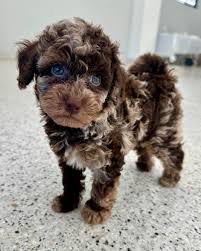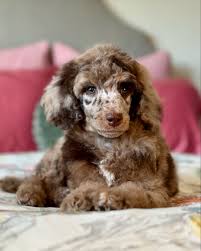Introduction
Merle Poodles for Sale is one of the most famous and versatile dog breeds around the world, with its distinctiveness in being intelligent, elegant, and lovely to be with. In recent years, the breed gained popularity in different sizes such as Standard, Miniature, and Toy, each with its respective characteristics. Among the various Poodle breeds, the Merle Poodle is one of the most outstanding due to its unique coat pattern.

What is a Merle Poodle?
The Merle Poodle is a variation of the standard Poodle breed, characterized by the Merle coat pattern. The Merle pattern is a heredity characteristic, wherein the coat of a dog or animal appears as being mottled or marbled with darker patches over a lighter background. Hence, it produces striking appearance. Merle gene impacts on pigmentation in the coat and causes a variety of color combinations; they may be blue, grey, sable, chocolate, or red. Merle Poodles are really unique-looking dogs differing from other Poodles.
Although the Merle gene is possible in all three types of Poodles-Standard, Miniature, and Toy-the Merle Poodle occurs most frequently in the Miniature and Standard varieties. The Merle pattern has not become widely recognized by major kennel clubs, such as the American Kennel Club (AKC), as it is a relatively recent characteristic to be found in Poodles and has been associated with some health issues. Still, Merle Poodles are highly prized for their beauty and personality.
Appearance of the Merle Poodle
Coat and Color Patterns
The most striking characteristic of these Poodles is the Merle coat. The base color of this Merle Poodle may vary from blue to silver, gray, sable, and sometimes chocolate, carrying darker, irregular patches all over the coat. Some Merle Poodles can have a uniform marbled appearance, while the rest may present an unevenly spread color, which adds up to their unique features.
Merle markings can vary by including other markings on the chest, face, or paws in the form of white or tan spots. These markings may be similar to what’s commonly referred to as “phantom” markings, which are generally common in other breeds. A few Merle Poodles may have lighter or darker eyes, such as blue or amber eyes, making them stand out more.
The Merle Poodle’s coat is dense, curly, and soft, much like all varieties of Poodle. Their curly hair aids in their ability to reduce shedding, and many consider the coat to be hypoallergenic; however, regular grooming and maintenance are necessary to ensure the coat stays in healthy condition.
Size
Merle Poodles are bred to come in three different sizes: Standard, Miniature, and Toy. The size you are buying will depend on the breed type (Standard, Miniature, or Toy) and the size of its parents.
- Standard Poodle: Usually weighs between 45 and 70 pounds and stands over 15 inches tall.
Miniature Poodle – 10 to 15 pounds, 10 to 15 inches tall at the shoulder
Toy Poodle – the smallest breed of them all. A toy poodle is rather small, weighing only between 4 to 6 pounds, with a smaller height of less than 10 inches.
Regardless of the size, the Merle Poodle possesses a gracious, athletic body accompanied by a notable, noble appearance. However, though coat color is an obvious characteristic, intelligence, elegance, and expressive eyes are essential traits of a Poodle.

Temperament of the Merle Poodle
Poodles, in general, are known for their friendly, intelligent, and loyal temperament, and the Merle Poodle is no different. Their personality often shines through in their playful and loving behavior. The following traits are typical of Merle Poodles:
Intelligence
Among the very intelligent dog breeds, the Merle Poodle is not an exception. They are quick learners, highly trainable, and thrive in environments where they are mentally stimulated. They would be excel at obedience training and enjoy activities of agility courses, tricks, or interactive puzzle toys.
Because of their intelligence, it’s essential to keep Merle Poodles mentally engaged, as they can become bored and destructive if left without stimulation. Training a Merle Poodle can be a rewarding experience, and positive reinforcement methods, such as treats and praise, work best with them.
Playful and Energetic
Even with their beautiful coat, Merle Poodles are energetic dogs that need regular exercising. They love to play and can be initiating games such as fetch, tug-of-war, or even swimming. Whether it’s playing in the park or romping in the backyard, Merle Poodles are always up for a good time.
Affectionate and Loyal
Merle Poodles are affectionate dogs that can often cling to their owner. They are friendly and love spending time with their family. They are known as good companions and, if socialized early, are usually good with children and other pets. Their friendly nature makes it even suitable for a family home and a place with animals.
Alert and Protective
Even though Merle Poodles are considered to be generally nonaggressive, they become very alert and guarded toward their family. They may sometimes bark whenever someone approaches the door or when they sense something unusual in their environment. Not a classical guard dog, however, their vigilance and sharp hearing make them good watchdogs.
Health Considerations for Merle Poodles
Although Merle Poodles are characterized as healthful dogs, there are some concerns regarding specific health issues a prospective owner should learn about, especially since they carry a unique genetic pattern.
1. Progressive Retinal Atrophy (PRA)
One of the more common genetic health issues that affects Poodles, including Merle Poodles, is Progressive Retinal Atrophy (PRA). It’s a hereditary condition that causes degeneration in the retina. A clouding and detachment of the retina may impair partial or complete vision for affected dogs. Consider keeping the regimen of regular eye exams and try to find a reputable breeder that tests for health clearances on puppies and their parents.
- Deafness
The Merle gene has been associated with an increased incidence of congenital deafness in some animals. Poodles can suffer from hereditary deafness, especially those carrying the two copies of the merle genes. Breeding dogs are screened for hearing impairment by a responsible breeder. Before choosing any Merle Poodle, buyers must be prepared to take the risk. - **Hip Dysplasia
Although hip dysplasia can occur in many other breeds of dogs, Poodles are also prone to it. Hip dysplasia is a condition that leads to arthritis or lameness because the hip joint does not properly develop. Though more common with larger Poodles, it can also occur in Miniature or Toy Poodles. Management can include prevention of excessive weight, exercise, and early diagnosis.
4. Epilepsy
Poodles, Merle Poodles included, sometimes inherit epilepsy; epilepsy is characterized by recurrent seizures. Epilepsy is usually hereditary but can often be controlled with medication and frequent veterinary treatment.
5. Dental Problems
Since Poodles are small dogs, dental issues, like gum infections, tooth rotting, etc., are common in this breed. Daily brushing of their teeth, dental checkups, and proper chew toys will help ensure they’re well-looked after.
Grooming and Care for Merle Poodles
Poodles have a hypoallergenic, curly coat that requires regular grooming to keep it healthy. The Merle Poodle’s coat is no different, and it needs proper care to prevent matting and maintain its beautiful appearance. Here’s how to care for your Merle Poodle:
Coat Maintenance
- Brushing: Merle Poodles should be brushed at least 3 to 4 times a week. This will help prevent tangles and mats, since their curly coat can easily become knotted.
- Bathing: Poodles should be bathed every 4 to 6 weeks, or as needed, with a mild dog shampoo.
- Trimming: Trimming should be done every 6 to 8 weeks to keep them looking neat and healthy. They require professional grooming to maintain the top quality of their coat.
- Ear Care: Regular cleaning of ears is important because Poodles have floppy ears that may trap moisture and debris, causing infections.
- Nail Care: Poodles require regular nail trimming to avoid overgrowth. Use proper dog nail clippers and be cautious around the quick.
Diet and Nutrition
Merle Poodles require a high-quality, well-balanced diet according to their age, size, and activity level. Growing puppies need a lot more calories and protein, whereas adult Poodles need a balanced diet to help maintain a healthy weight. Consult your veterinarian for your dog to know you’re feeding them the best nutrition.
Exercise and Mental Stimulation
Merle Poodles-whether Miniature or Standard-are kept active physically and mentally. Consider providing exercise for 30 to 60 minutes per day, such as walks, play sessions, or interactive games. In addition to providing physical exercise, Poodles also need intellectual stimulation with puzzle toys, training sessions, and learning of tricks to keep your dog happy and healthy.
Buying a Merle Poodle: What to Look for
Buying a Merle Poodle involves being highly selective about what characteristics make up an excellent companion. Some factors to consider when finding one
- bred dog include:
1. Reputable Breeders
This is very important to obtain from a responsible breeder who truly cares about their dogs’ health and well being. A responsible breeder will give health clearances for the puppy’s parents on some issues like eye tests, hearing tests, and hip evaluations. Be careful from the breeders who emphasize on looks rather than health since this may bring with it various genetic problems in the future.
2. Health Screenings
Ensure that the breeder has health tested for hereditary conditions such as PRA, deafness, and hip dysplasia. See the results of the test performed and discuss potential health concerns with the breeder.
3. Socialization and Environment
A responsible breeder will make sure that their puppies grow to be very socialized and raised in a clean, safe environment. Puppies should be offered a mix of sights, sounds, and experiences in preparation for life in a family home.
FAQ
1. How much does a Merle Poodle cost?
Prices for a Merle Poodle may range extensively depending on the factors of reputation of the breeder, location, and size of the dog. Typically, Merle Poodles average between $1,500 to $4,000 or higher, depending on rare color combination or champion-line pedigree.
2. Are Merle Poodles hypoallergenic?
Yes, Poodles are known to be hypoallergenic because of their curly coat; they create less dander than other breeds. However, no dog is fully hypoallergenic, and even among these breeds, reactions differ among individuals.
3. How long do Merle Poodles live?
Merle Poodles live on average 12-15 years depending on genetics, diet, and health care.
4. **Are Merle Poodles good with children?
Yes, Merle Poodles are generally good with children, especially when properly socialized. They tend to be affectionate, playful, and gentle.
5. How much exercise do Merle Poodles need?
Merle Poodles need at least 30 to 60 minutes of exercise per day, including both physical and mental stimulation.
6. Are Merle Poodles prone to health problems?
Merle Poodles can inherit some genetic health issues, such as Progressive Retinal Atrophy (PRA), hip dysplasia, and deafness. Regular veterinary care and choosing a responsible breeder can help minimize these risks.
Conclusion
Merle Poodles are stunning dogs with unique, marbled coats and endearing personalities. They are very intelligent, affectionate, and playful, thus making great companions for families, singles, and active individuals. Although buying a Merle Poodle involves a great deal of concerns for the health requirements and grooming, chances are very high you’re going to find it from a reputable breeder. So by reading this guide you will ensure that your Merle Poodle thrives in your home with your care.

